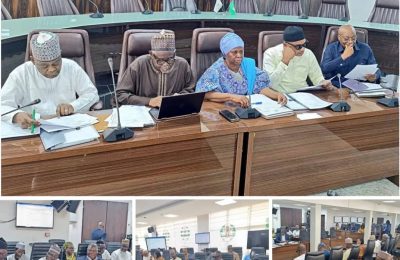
AN expert in the field of agriculture, Mr Kayode Olaitan, has suggested ways by which the Federal Government of Nigeria can fix the problem of food insecurity being experienced in the country at the moment.
Olaitan, who is the Chief Executive Officer of Fempanath Nigeria Limited, noted that returning all IDPs to their ancestral land in their villages and towns, making laws banning open grazing across the country, promoting local production and manufacturing of agricultural equipment and implements in the country, and encouraging and approving of the study of “agricultural science” in secondary and postsecondary educational institutions, could assist in averting further food insecurity in the country.

He also posited that the reintroduction of effective and quality technical education to produce artisans, craftsmen, and technicians, the enhancement of the effectiveness of agricultural research institutions, and the relevance of their research works to the needs of the country are other methods to avert this crisis.
According to Olaitan, the United Nations (UN), recent report on acute food insecurity in the first quarter of 2024 projected a worsening in magnitude and severity across 18 hunger “hotspots,” including Nigeria.
“The report, which emphasised the immediate need for assistance to prevent famine in Gaza and Sudan, as well as the worsening hunger crises in Haiti, Mali, and South Sudan, also warns about the continuous effects of El Niño and the impending risk of La Niña, which could lead to extreme climate events that disrupt both lives and livelihoods.
“In Nigeria, we can affirm that before Q2 2023, insecurity was the most significant bane of food production.
“Most agrarian communities in the middle belt region of Nigeria have been sacked by marauding armed bandits and herdsmen, thus displacing the farmers to Internally Displaced Peoples (IDP) camps across the country, and this remains a major challenge in several places in the country today.
“The escalated costs of practically all agricultural inputs and services include the high cost of tractors, implements, fertilisers, irrigation materials, and high land preparation service costs.
“The unavailability of manual farm workers due to the laborious nature of the work is one of the major reasons there will be a continuous worsening of food crises in Nigeria.
“Imagine the entire population of Ogun State not knowing where their next meal will come from.
“Even as one of the most populated states and industrial hubs in Nigeria, this uncertainty is a reality of daily life. We therefore urge the federal government to urgently fix insecurity to fix the foretold food crises in the country.
“Conclusively, while we want to solidly stand with this government, we urge the federal government to ensure that research output reports do not just decorate the libraries of the research institutions but that they are translated into useful inputs into agriculture and the development of appropriate technology equipment for the agricultural sector in order to significantly reduce manual farm work and encourage the youth to participate more in the sector to block the foretold food crisis in Nigeria.”
ALSO READ: Aiye-ko-ooto’s ‘The Noble Warrior’ celebrates Soyinka








